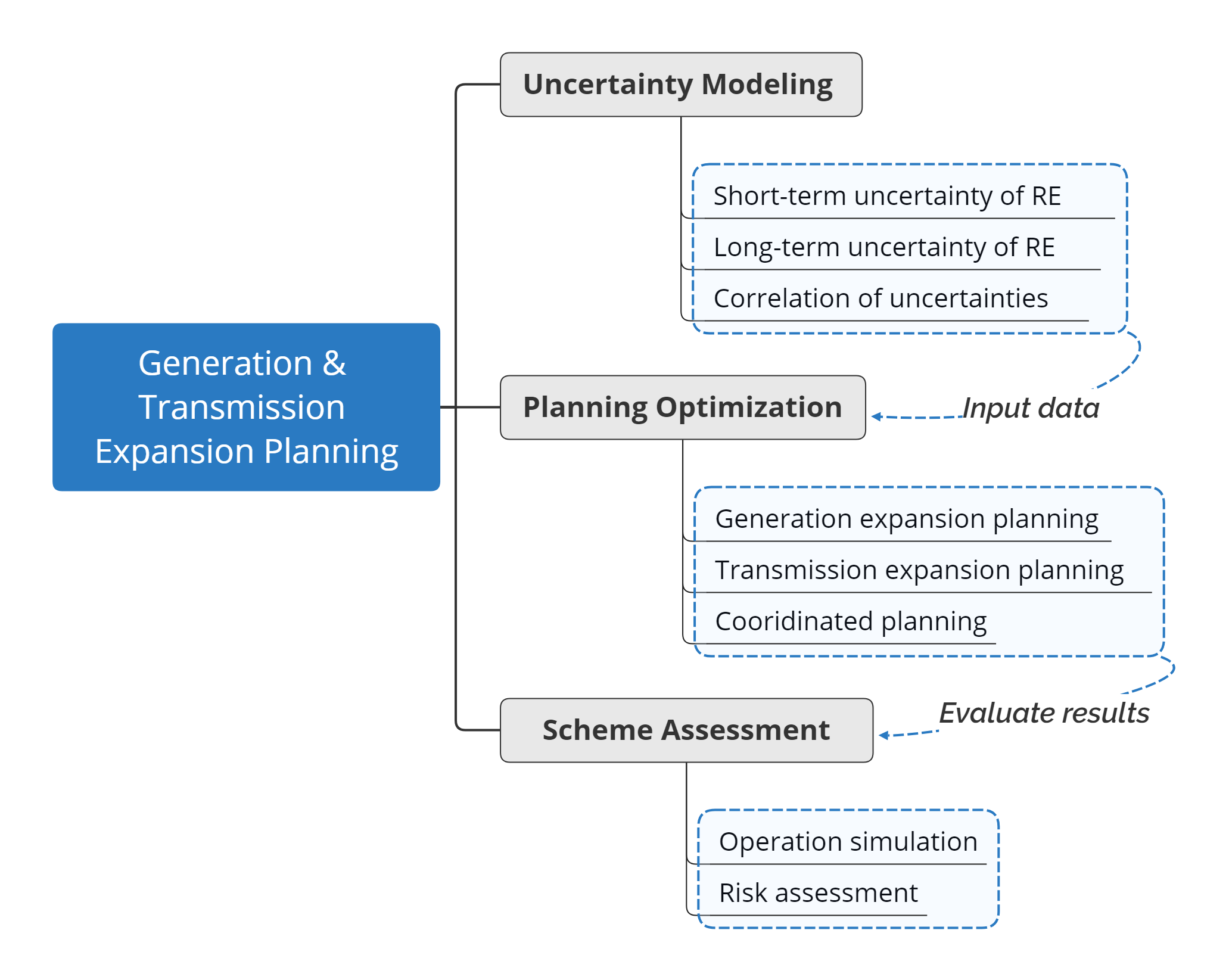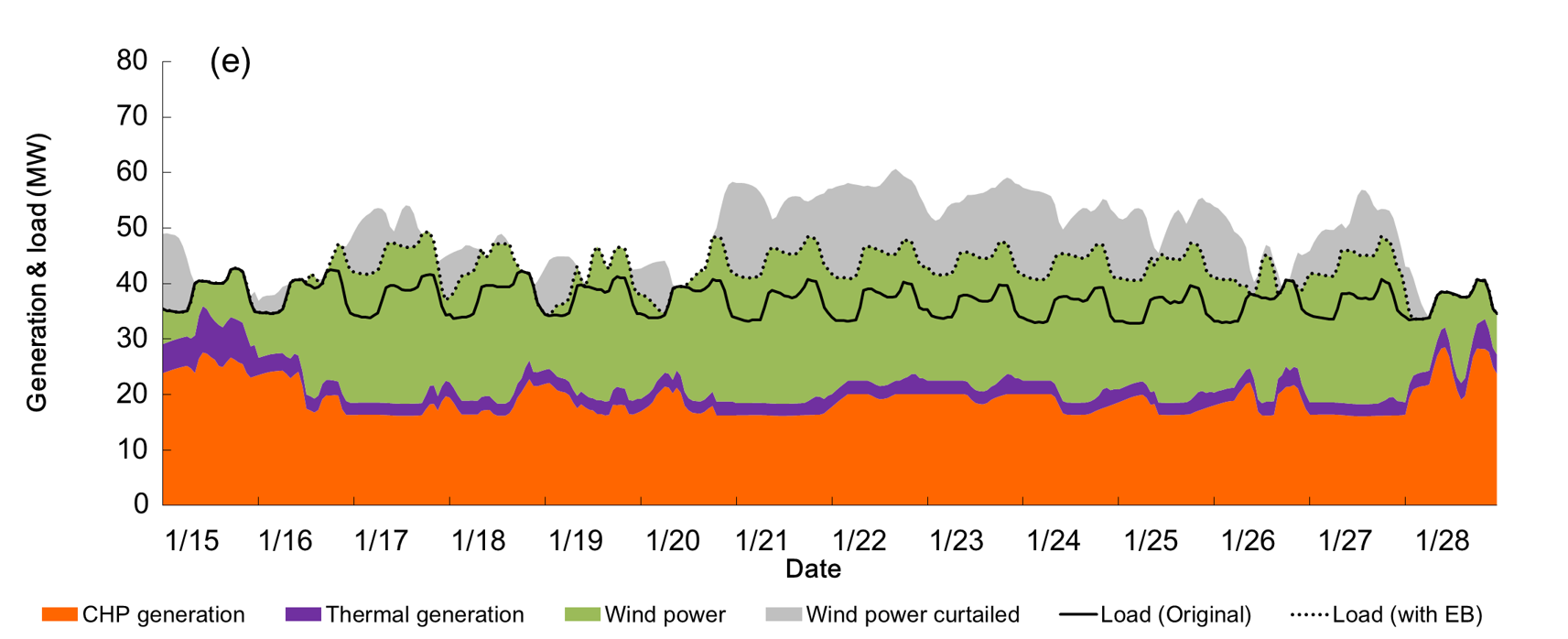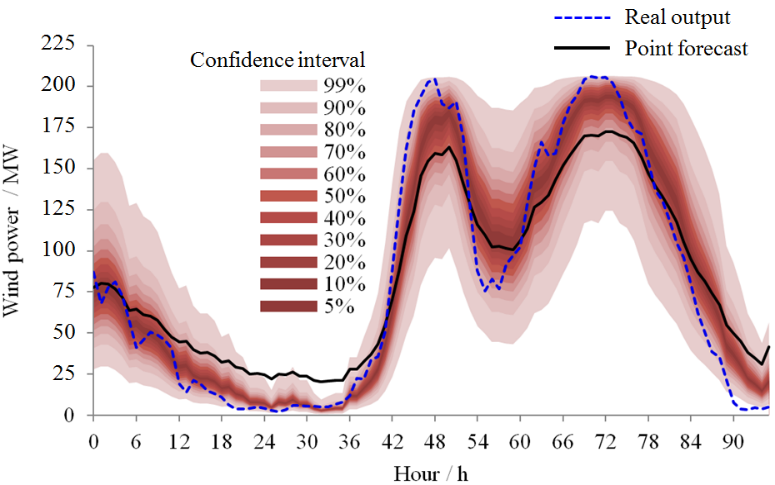Generation & Transmission Expansion Planning
With the development of electrical technologies, more and more new participators are integrated into the power system such as high penetrated renewable energy (RE), electrical vehicles, demand response and deregulation of power industry. In future power generation and transmission planning, one of the main challenges is how the power system responds to the new factors and the growing uncertainties they brought about. I split the generation & transmission expansion planning problem into three stages, namely, modeling of uncertainty, planning optimization and scheme assessment. The modeling of uncertainty is the foundation of following planning optimization and the obtained optimal results are supposed to be evaluated by scheme assessment. Efforts have been made at each stage.
 |
Uncertainty Modeling
Planning Optimization
 |
Practical power system planning modeling method are studied on the foundation of uncertainty model. The increasing complexity of power systems rises the necessity of incorporating detailed power system operation models into long-term planning studies. Planning of pumped storage for wind power integration are discussed in my work. Considering the interacting of storage equipment and invested transmission lines, corresponding coordinated planning model is proposed. To incorporate operational flexibility in power system planning studies, a high-efficiency and simplified network-constrained unit commitment model for system planning is studied.
Scheme assessment
The obtained planning scheme are supposed the evaluated in operation simulation and risk assessment, so we can quantify the quality of the results. The assessment tool used is part of a power system planning, decision-making, and evaluation package named “GOPT”, a platform integrating related research achievement in our lab. This software package was designed to simulate chronologically the operation of a power system on a daily basis with a resolution of one hour. It thus makes possible a fine grain assessment of the feasibility, reliability, and economics of generation and transmission expansion planning. Several case studies on real situation in China have been done to show the effectiveness and provided practical advices such as the impacts on RE curtailment by employing electrical boiler.
Related Publications:
Yaohua Cheng, Ning Zhang, Zongxiang Lu and Chongqing Kang. Planning Multiple Energy Systems towards Low-Carbon Society: A Decentralized Approach, IEEE Transactions on Smart Grid, 2018. accepted, in press. “Link”
Jingwei Yang, Ning Zhang, Yaohua Cheng, Chongqing Kang and Qing Xia. Modeling the Operation Mechanism of Combined P2G and Gas-fired Plant with CO2 Recycling, IEEE Transactions on Smart Grid, 2018. accepted, in press. “Link”
Yaohua Cheng, Ning Zhang, Yi Wang, Jingwei Yang, Chongqing Kang and Qing Xia. Modeling Carbon Emission Flow in Multiple Energy Systems, IEEE Transactions on Smart Grid, 2018. accepted, in press. “Link”
Wujing Huang, Ning Zhang, Jingwei Yang, Yi Wang and Chongqing Kang. Optimal Configuration Planning of Multi-Energy Systems Considering Distributed Renewable Energy, IEEE Transactions on Smart Grid, 2017. accepted, in press. “Link”
Yi Wang, Ning Zhang, Chongqing Kang, Daniel S. Kirschen, Jingwei Yang and Qing Xia. Standardized matrix modeling of multiple energy systems, IEEE Transactions on Smart Grid, 2017. accepted, in press. “Link”
Yi Wang, Jiangnan Cheng, Ning Zhang and Chongqing Kang. Automatic and linearized modeling of energy hub and its flexibility analysis, Applied Energy, 2018, 211: 705-714. “Link”
Yi Wang, Ning Zhang, Zhenyu Zhuo, Chongqing Kang and Daniel Kirschen. Mixed-integer linear programming-based optimal configuration planning for energy hub: Starting from scratch, Applied Energy, 2018, 210: 1141-1150. “Link”
Jingwei Yang, Ning Zhang, Chongqing Kang and Qing Xia. Effect of Natural Gas Flow Dynamics in Robust Generation Scheduling under Wind Uncertainty, IEEE Transactions on Power Systems, 2018, 33(2): 2087-2097. “Link”
Ning Zhang, Xi Lu, Michael B. McElroy, Chris P. Nielsen, Xinyu Chen, Yu Deng and Chongqing Kang. Reducing curtailment of wind electricity in China by employing electric boilers for heat and pumped hydro for energy storage, Applied Energy, 2016, 184: 987-994. “Link
